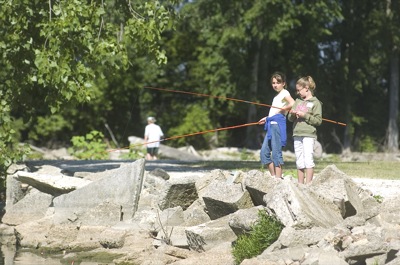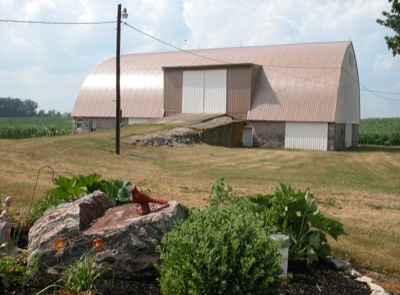Friday, July 13th, 2007
Biologist helping landowners conserve
By Nancy Allen
A wildlife biologist has been hired to help landowners in Mercer and Auglaize counties gain money from the Farm Bill for conservation practices.
Mitchell Hess started in the new position June 15. He works out of the Auglaize County Soil and Water Conservation District office in Wapakoneta and splits his time between both counties.
Hess, who grew up on a grain and hog farm in Fowler, Ind., said he has always liked nature.
"There was a lot of habitat around farms in the 1970s, but now there's not so much," Hess said. "I want to try to help bring it back."
His salary is being paid by funds from the Auglaize and Mercer County chapters of Pheasants Forever, the USDA's Natural Resources Conservation Service (NRCS) and the Ohio Division of Wildlife.
Pheasants Forever first began employing Farm Bill biologists in 2005 and so far have 27 of them working throughout the United States. Hess is the seventh one hired in Ohio.
The biologist program has really caught on and helped educate more landowners about the benefits of conservation, said Jim Inglis, who coordinates the biologist program for Pheasants Forever, an organization dedicated to the conservation of pheasants, quail and other wildlife.
"We need more staff to get the word out about conservation and meet hand-in-hand with landowners, and the biologists help with that," he said. "We get a bigger bang for the money we invest by combining our resources having this partnership."
Hess will work closely with USDA Farm Service Agency (FSA) officials and the counties' district conservationists.
The FSA office administers funds for programs that conserve soil and water and improve water quality and district conservationists provide technical assistance to landowners. Funds for conservation programs come from the 2002 Farm Bill, which contains about $17 billion for conservation efforts.
"If a landowner wants to do something, whether it's on 1 acre or 100 acres, give Mitch a call," Inglis said. "Even if they have land in another state, Pheasants Forever has a network to get them contacted with the right people."
Hess, who lives in New Bremen, will switch back and forth weekly between both counties.
He already has met with some landowners to discuss installing habitat on their land through the USDA's Conservation Reserve Program and Lake Erie Conservation Reserve Enhancement Program. The programs pay landowners to take agricultural land out of production and plant warm and cool season grasses, grass-covered filter strips and trees and install other conservation practices. All of the practices are meant to lessen soil erosion and improve water quality. They also create wildlife habitat for woodland and grassland birds and other animals.
Hess has a bachelor's degree in wildlife science from Purdue University in West Lafayette, Ind., While at Purdue, he worked in the university's Forestry Natural Resource Department clearing invasive plants from and restoring prairie and savanna areas by planting them with native prairie grass and trees.
Hess can be contacted at 419-738-4016 (office) or 419-953-5147 (cell).


